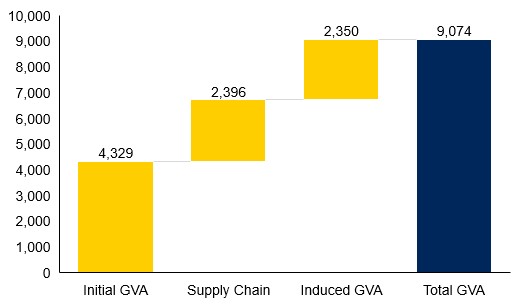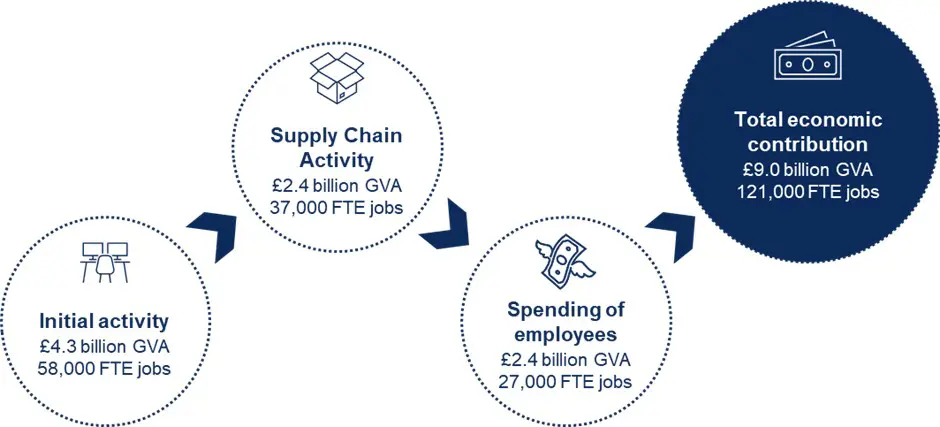CBI Economics analyses the AI economy and highlights why its governance will be key to supporting growth
Key takeaways
- The UK AI industry could contribute more to the economy than the country’s travel agents, as those firms measured contribute around £9bn in GVA each year.
- AI firms support just over 120,000 full-time equivalent (FTE) employees across the UK, 0.5% of total jobs across the UK economy.
- These firms are currently attracting more investment than the net zero economy.
Whether you look on Artificial Intelligence (AI) with hope or fear, for your business, your job or for society, CBI Economics has teamed up with The Data City to bring you the facts about the significance it already has for the UK economy.
Putting a finger on the economic impact of the AI industry isn’t easy. It’s difficult to map these companies onto traditional Standard Industrial Classification (SIC) codes. So we’ve used our proprietary in-house model to estimate the economic contributions of AI companies that fall within The Data City’s definition of the industry.
This states the industry is made up of companies working with AI in areas such as: data analysis, enabling platforms, image processing, machine learning, natural language processing, blockchain, greentech, life sciences, industry 4.0 and automation, systems optimisation and signal processing.
Although we cover the value derived from the jobs these AI specialists create, the supply chain they support and the demand they fuel, we don’t consider additional economic benefits from the adoption of AI across other industries. These could be just as significant.
Don’t underestimate the impact of the UK’s AI industry.
In the UK there are currently 3,011 companies classified as AI companies by The Data City, of which 38% are based in London and 17% in the South East. This is unsurprising given that these two regions create the highest levels of economic activity in the computer programming and information service industry.
The Data City classifies nearly three quarters (73%) of AI companies in the UK as start-ups and only 13% of AI companies in the UK are considered ‘established’. The total number of active AI companies has grown 161% since 2013.
Our modelling estimates that activity by these AI companies is currently supporting a total of £9.1bn in gross value added (GVA) per year to the UK economy, equivalent to 0.5% of the UK’s total GVA. For comparison, this is nearly equal to the GVA generated by the travel agency sector in the UK (£9.5bn).
Figure 1: Total GVA contribution of the AI economy

Source: CBI Economics analysis, 2023
Just under half (48%) of the total GVA, or £4.3bn, was generated directly by the activities of AI companies. The wider economic contributions associated with the AI economy generated £4.8bn in GVA respectively. Even though these are significant figures, it’s likely that they underrepresent the total value being added to the UK economy by AI. Taking into consideration the potential increases in productivity, innovation and quality of products that AI will generate, the total GVA contributions are likely to be higher.
Our modelling also shows that AI companies are supporting just over 120,000 full-time equivalent (FTE) employees across the UK. This accounts for just under 0.5% of total jobs across the UK economy. Just under half (48%) of these FTE jobs were created directly by the AI economy with the remaining being created by the supply chain and household spending.
Figure 2: Total economic contribution of AI companies

Source: CBI Economics analysis, 2023
Given the potential benefits on productivity and outputs of integrating AI into business models, the AI economy is very attractive to investment. Data from Dealroom shows that AI companies have seen a total of £38.6bn in investment funding since 2016. This is more than the investment in the net zero economy (£35.3bn) and almost double the investment in the energy generation sector (£19.7bn). Such high investment could be due to the importance AI is believed to have in advancing both business and wider society.
Productivity, in terms of value added, within the AI economy is higher than the UK average. We found full-time employees of an AI company produce, on average, £75,000 in value to the UK economy – making the jobs created by AI economy 7% more productive than the average UK job. The technology itself also has the potential to bring significant productivity benefits to jobs across the economy.
The contribution of the growing AI industry itself is not the only value AI will bring to the UK economy
Just considering the contributions of the AI industry’s activities on the UK economy severely downplays the true benefits of AI. It’s such a hot topic because of its potential to fundamentally change all aspects of our digital lives and raise the game on productivity for all sorts of businesses.
A Public First report, published by Google, predicts that the productivity increases resulting from generative AI could save the average worker over 100 hours per year by 2030. Something that can be maximised if the labour force is trained to understand how they can effectively implement AI.
Job losses caused by the new technology can be offset by the jobs it creates. And the higher productivity that can be expected from such roles will also promote higher wages and allow for greater social mobility.
When the UK has an aging population, which will lead to a shrinking workforce, there’s an opportunity for AI to help mitigate the impacts of this on the UK’s economic output. Likewise, AI could help with the current skill shortages experienced by businesses across the UK – if more focus was placed on retraining.
The opportunity for AI to supercharge innovation in the UK is another key benefit. By freeing up talent from time consuming processes, such as data processing and manipulation, AI allows more time for creative thinking. This impact will be felt across all sectors of the economy, as AI can be used to help teachers design and create lesson plans or help healthcare professionals analyse medical data to aid in diagnosing health issues and everything in between.
While there are security and privacy concerns, these can be mitigated by a strong legal framework developers must follow. And getting AI governance right will be key to unlocking the full benefits of AI for the UK.
The current approach to AI governance (outlined in the government’s AI regulation policy paper) has been welcomed by business. However, there are still some improvements to be made to ensure a suitable environment can be created for the development of AI.
The CBI has set out three recommendations to ensure AI governance can support growth:
- Strike the right balance between decentralisation and coordination
- Use a blend of principles and guidance to ensure the non-statutory approach is effective
- Position the UK as a global leader and the best place in the world to develop AI business models.
Read more about the CBI policy paper on Regulating AI and find out about its response to the latest government consultation on the issue.
Given its potential, AI should be seen as a tool for businesses and employees that will enhance our economy if they integrate it into their business models effectively. Drawing what may be a more comfortable parallel for many business leaders: the emergence of Excel didn’t make accountants obsolete, but knowing how to use it has become a job requirement. Understanding the contribution AI is already making to the UK might just make it easier for more firms to join the discussion on how best to embrace its benefits.
About CBI Economics:
At CBI Economics, we have a team of dedicated economists with wide-ranging experience in evidencing policy recommendations. We can help you calculate the fiscal costs of your policy ideas, demonstrate their economic impact, and even help you to best articulate the issues you face through economic evidence.
Get in touch today to find out more about economic consultancy from CBI experts.










